
Top 7 Walnut.io Alternatives for Your Demo Needs
.webp)
Heading 1
Heading 2
Heading 3
Heading 4
Heading 5
Heading 6
Lorem ipsum dolor sit amet, consectetur adipiscing elit, sed do eiusmod tempor incididunt ut labore et dolore magna aliqua. Ut enim ad minim veniam, quis nostrud exercitation ullamco laboris nisi ut aliquip ex ea commodo consequat. Duis aute irure dolor in reprehenderit in voluptate velit esse cillum dolore eu fugiat nulla pariatur.
Block quote
Ordered list
- Item 1
- Item 2
- Item 3
Unordered list
- Item A
- Item B
- Item C
Bold text
Emphasis
Superscript
Subscript

If you’re in the market for demo automation software, you’ve probably come across Walnut - one of the more well-established interactive demo vendors in this space. While Walnut certainly has its strengths (especially for sales-focused use cases), it’s not without its limitations.
Why consider alternatives to Walnut.io
- HTML-only demos: Walnut focuses on HTML/CSS-based demos, which can be limiting when teams need video walkthroughs or screenshot-based demos.
- User satisfaction challenges: Walnut currently ranks 17th on G2's demo automation category with a satisfaction score of 32/100.
- Sales team focus: Walnut is built primarily for sales teams, which can create friction for marketing, presales, or customer success needs.
- Significant upfront investment: With a starting price of $9,200/year and no free tier, Walnut requires a substantial commitment upfront.
We've spent hundreds of hours evaluating Walnut competitors and have spoken with dozens of customers about their experiences with Walnut and other leading interactive demo software. Based on those conversations and our own research, we've put together this guide to the top Walnut alternatives. Whether you're exploring product demo tools for the first time or looking to switch from Walnut to something that better fits your needs, this guide will help you understand your options.
TL;DR - Walnut alternatives at a glance
- Storylane - Best for ease-of-use and versatility
- Consensus - Best for video-focused demo experiences
- Supademo - Best pocket-friendly option for GTM teams
- Navattic - Best for HTML demo focused use cases
- Arcade - Best for image demo focused use cases
- Tourial - Best for micro tours and tour centres
- TestBox - Best for product overlay/live environments
- Saleo - Best for live sales demos
- Reprise - Best for enterprise sandbox environments
- Demostack - Best for cloned product environments
Walnut Alternatives - Comparison Summary
1. Storylane - Best for ease-of-use and versatility
When it comes to usability and versatility across marketing, sales, and presales use cases, Storylane is the leading demo automation software for B2B teams.
Why customers choose Storylane over Walnut
The differences between Storylane and Walnut become pretty clear when you look at customer feedback. For demo automation, Storylane currently ranks #1 on G2 with a 99/100 satisfaction score, while Walnut sits at 17th place with a 32/100 score. The main reasons customers prefer Storylane are:
- Multiple demo formats in one platform: Unlike Walnut's HTML-only approach, Storylane supports screenshot, video, AND HTML-based demos. This flexibility allows GTM teams to quickly create self-guided demos for early-stage discovery, build detailed sandbox environments for late-stage prospects, and share personalized video demos for followups, onboarding, etc.
- Significantly easier to use: With a dead simple demo builder and quick time to create, Storylane prioritizes accessible demo automation as evidenced by the 9.5/10 ease-of-use rating on G2.
- Agentic demo automation: Storylane's Lily AI includes a practical suite of AI features tools such as instant, product-aware demo creation, life-like presenter videos and voice overs, and prompt-based demo editing — no code needed. A lot more to come with Lily for discovery.
- Demo Hub for organizing content: For teams with multiple products or use cases, Storylane's Demo Hub creates galleries and playlists of demos that prospects can explore based on their interests – similar to Walnut's playlists but with more customization options.
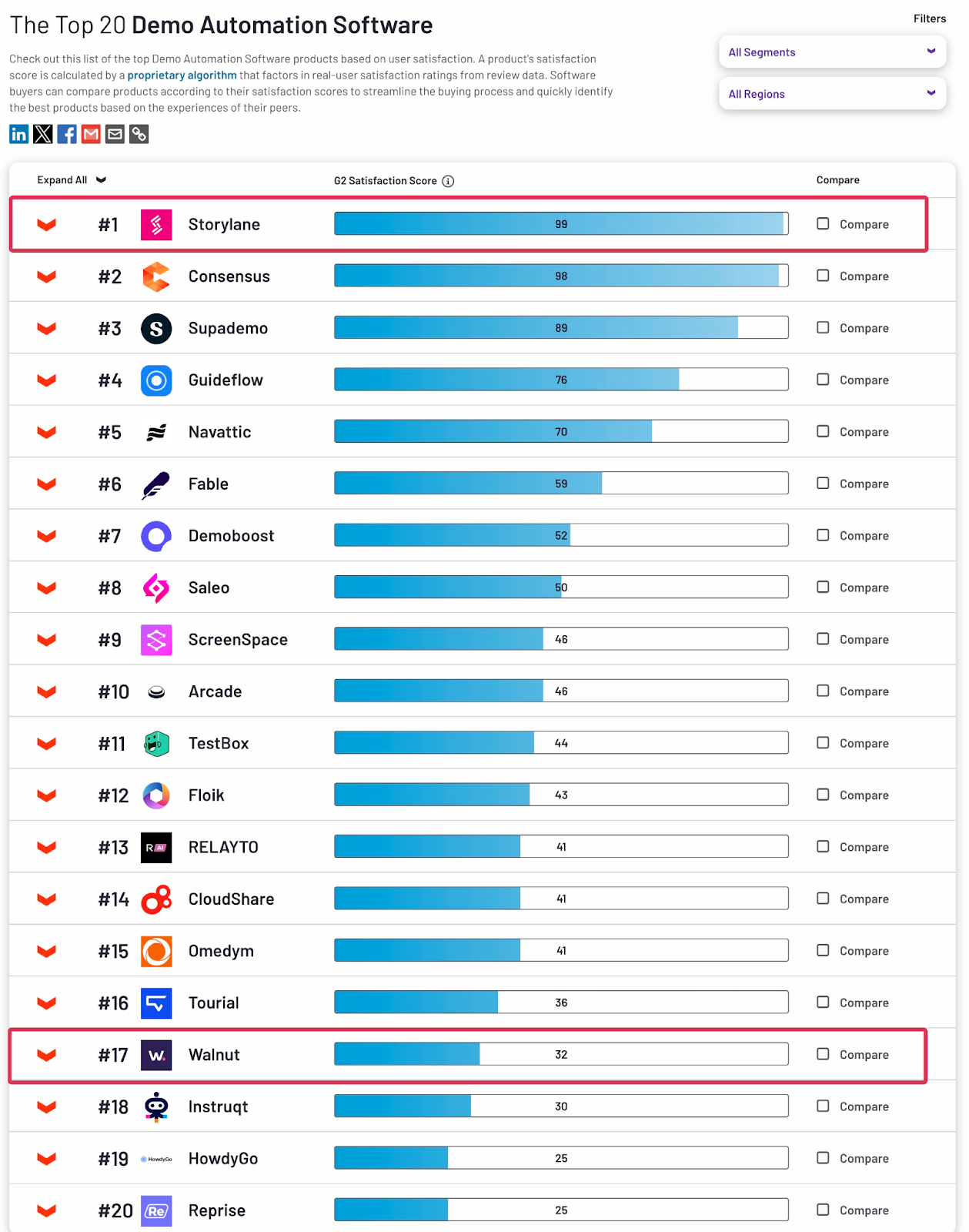
How pricing works
One of the biggest differences between Storylane and Walnut is the approach to pricing:
- Free plan to get started: Unlike Walnut's all-or-nothing approach, Storylane offers a free plan so you can test the waters before committing.
- Starter plan at $40/month: Includes image/screenshot demos, video demos, Lily AI, and account reveal features — only the latter of which is available on Walnut.
- Growth plan at $500/month: Adds HTML demos, 5 seats, personalization tokens, and more.
- Premium plan at $1,200/month: Includes Demo Hub, offline demos, and demo coaching.
- Enterprise plan: Custom pricing with sandbox demos, multi-workspaces, and enterprise security.
For comparable features to Walnut's $9,200/year plan, Storylane comes in at around $6,000/year – a 35% cost savings while providing better user satisfaction and more versatile capabilities.
Best fit for
Storylane works particularly well for:
- Companies that need demos across marketing, sales, presales and customer success
- Teams that want to create different formats of demos (Image, video, HTML, guided, sandbox)
- Teams that especi
If you’re in the market for demo automation software, you’ve probably come across Walnut - one of the more well-established interactive demo vendors in this space. While Walnut certainly has its strengths (especially for sales-focused use cases), it’s not without its limitations.
Why consider alternatives to Walnut.io
- HTML-only demos: Walnut focuses on HTML/CSS-based demos, which can be limiting when teams need video walkthroughs or screenshot-based demos.
- User satisfaction challenges: Walnut currently ranks 17th on G2's demo automation category with a satisfaction score of 32/100.
- Sales team focus: Walnut is built primarily for sales teams, which can create friction for marketing, presales, or customer success needs.
- Significant upfront investment: With a starting price of $9,200/year and no free tier, Walnut requires a substantial commitment upfront.
We've spent hundreds of hours evaluating Walnut competitors and have spoken with dozens of customers about their experiences with Walnut and other leading interactive demo software. Based on those conversations and our own research, we've put together this guide to the top Walnut alternatives. Whether you're exploring product demo tools for the first time or looking to switch from Walnut to something that better fits your needs, this guide will help you understand your options.
TL;DR - Walnut alternatives at a glance
- Storylane - Best for ease-of-use and versatility
- Consensus - Best for video-focused demo experiences
- Supademo - Best pocket-friendly option for GTM teams
- Navattic - Best for HTML demo focused use cases
- Arcade - Best for image demo focused use cases
- Tourial - Best for micro tours and tour centres
- TestBox - Best for product overlay/live environments
- Saleo - Best for live sales demos
- Reprise - Best for enterprise sandbox environments
- Demostack - Best for cloned product environments
Walnut Alternatives - Comparison Summary
1. Storylane [Get Started Now]
When it comes to usability and versatility across marketing, sales, and presales use cases, Storylane is the leading demo automation software for B2B teams.
Why customers choose Storylane over Walnut
The differences between Storylane and Walnut become pretty clear when you look at customer feedback. For demo automation, Storylane currently ranks #1 on G2 with a 99/100 satisfaction score, while Walnut sits at 17th place with a 32/100 score. The main reasons customers prefer Storylane are:
- Multiple demo formats in one platform: Unlike Walnut's HTML-only approach, Storylane supports screenshot, video, AND HTML-based demos. This flexibility allows GTM teams to quickly create self-guided demos for early-stage discovery, build detailed sandbox environments for late-stage prospects, and share personalized video demos for followups, onboarding, etc.
- Significantly easier to use: With a dead simple demo builder and quick time to create, Storylane prioritizes accessible demo automation as evidenced by the 9.5/10 ease-of-use rating on G2.
- Agentic demo automation: Storylane's Lily AI includes a practical suite of AI features tools such as instant, product-aware demo creation, life-like presenter videos and voice overs, and prompt-based demo editing — no code needed. A lot more to come with Lily for discovery.
- Demo Hub for organizing content: For teams with multiple products or use cases, Storylane's Demo Hub creates galleries and playlists of demos that prospects can explore based on their interests – similar to Walnut's playlists but with more customization options.
Ready to experience why Storylane beats Walnut? Sign up for your free Storylane account and create your first multi‑format demo in under 10 minutes.

One of the biggest differences between Storylane and Walnut is the approach to pricing:
- Free plan to get started: Unlike Walnut's all-or-nothing approach, Storylane offers a free plan so you can test the waters before committing.
- Starter plan at $40/month: Includes image/screenshot demos, video demos, Lily AI, and account reveal features — only the latter of which is available on Walnut.
- Growth plan at $500/month: Adds HTML demos, 5 seats, personalization tokens, and more.
- Premium plan at $1,200/month: Includes Demo Hub, offline demos, and demo coaching.
- Enterprise plan: Custom pricing with sandbox demos, multi-workspaces, and enterprise security.
For comparable features to Walnut's $9,200/year plan, Storylane comes in at around $6,000/year - a 35% cost savings while providing better user satisfaction and more versatile capabilities.
Best fit for
Storylane works particularly well for:
- Companies that need demos across marketing, sales, presales and customer success
- Teams that want to create different formats of demos (Image, video, HTML, guided, sandbox)
- Teams that especially value ease of use and scalability
G2 Rating: 4.8/5
Book a demo and build killer demos in 2 minutes!
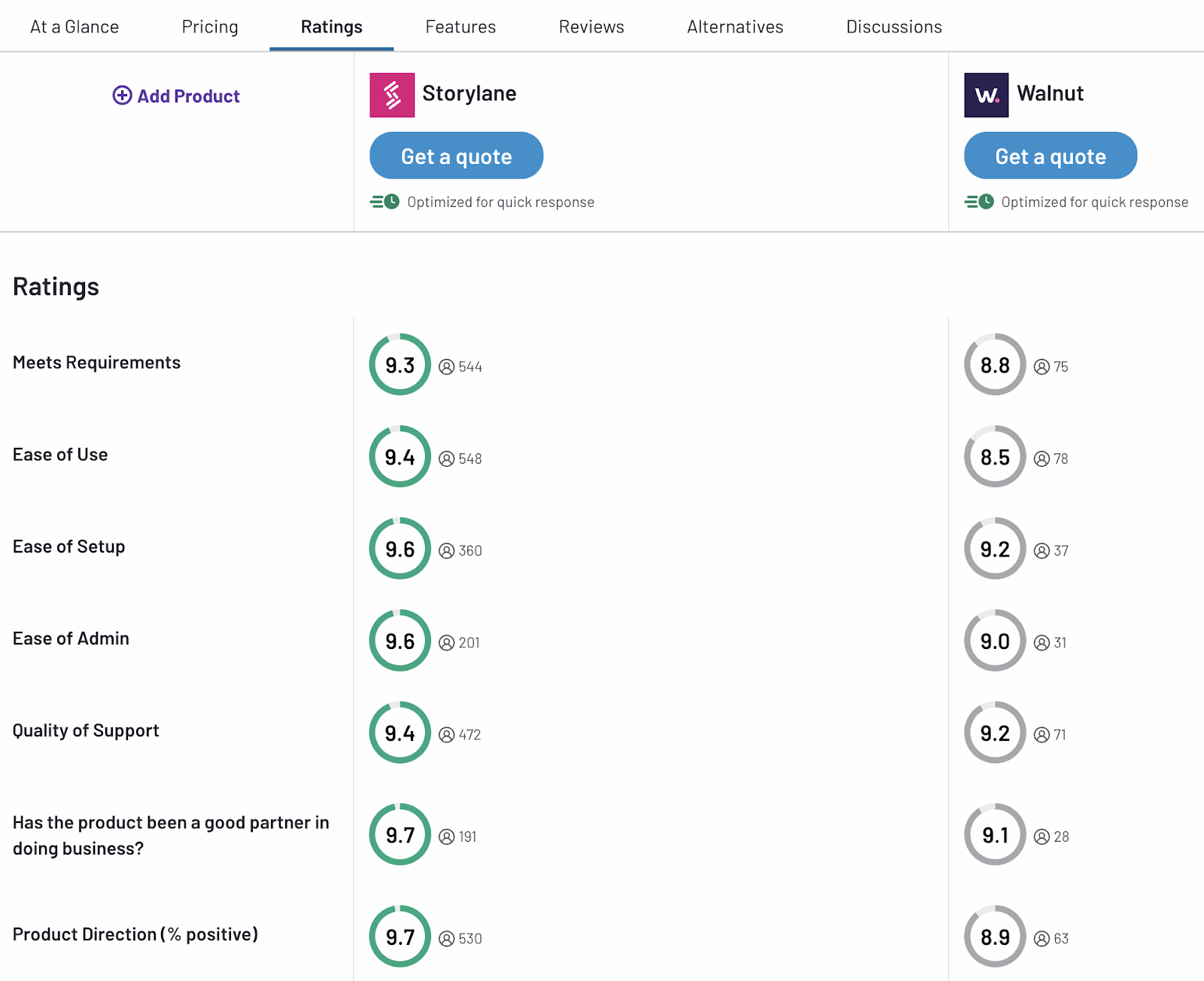
2. Consensus - Best for video-focused demo experiences
Consensus has been around longer than most other vendors on this list — and in that time have carved out a strong reputation for video-based demo experiences, especially for sales and presales teams.
.gif)
Why customers choose Consensus over Walnut
Consensus’s interactive video demos guide prospects through pick your adventure style journeys. Their platform lets you create branching video experiences where viewers can choose their own path based on their role, interests, or pain points. The platform shines in a few key areas:
- Depth of video capabilities: Their video demo tools include sophisticated branching logic, viewer selection options, and personalization features that go beyond what most platforms offer.
- Strong analytics: Consensus provides detailed tracking of which prospects watched which sections, for how long, and what interested them most – giving sales teams valuable insights for followups.
- Expanding capabilities: Through their acquisition of Reachsuite, Consensus has begun adding screenshot-based demos to complement their video-focused approach (though they still don't offer HTML demos like Walnut or Storylane).
How pricing works
Consensus operates at the premium end of the market:
- Typical, contracts start around $12,000 per year
- Enterprise customers can expect to pay $50,000-$100,000 annually
- No free plan available
Best fit for
Consensus works well for:
- Enterprise sales and presales orgs with dedicated demo teams
- Companies with complex products that require detailed explanation
- Sales teams that prioritize video-based education over interactive exploration
- Organizations with the budget to invest in a specialized video demo platform
The main limitation is that Consensus remains predominantly video-focused without the HTML demo capabilities that Walnut offers, making product updates more time-consuming as you'll need to re-record videos rather than simply updating captured screens.
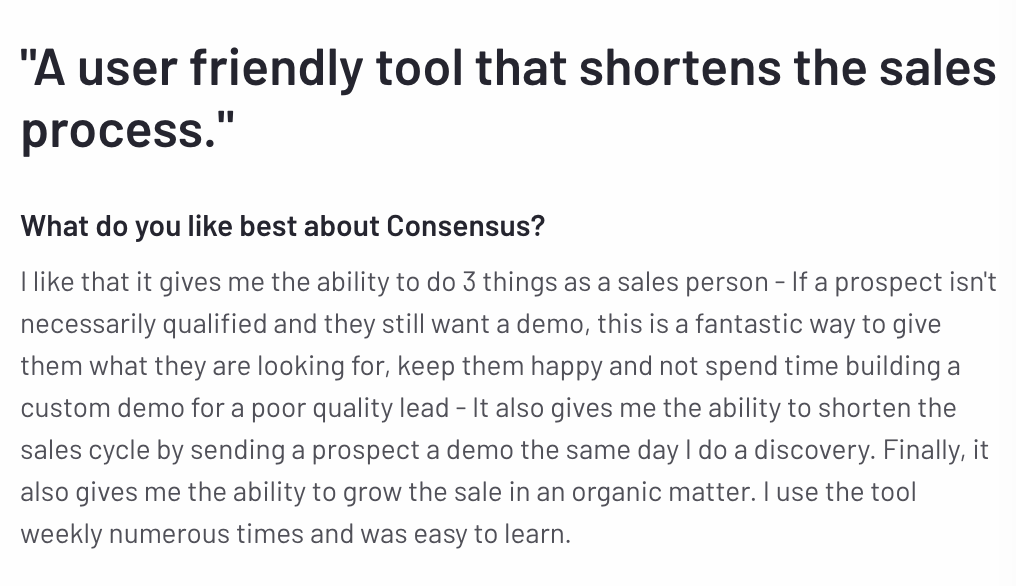
3. Supademo - Best pocket-friendly option for GTM teams
For teams with limited resources that still need professional-quality demos, Supademo offers an appealing balance of features and affordability.

Why customers choose Supademo over Walnut
Supademo has quickly gained traction as a cost-effective Walnut alternative with:
- Multiple demo formats: Unlike Walnut's HTML-only approach, Supademo supports screenshots, and HTML capture.
- Budget-friendly pricing: Plans starting at just $27/user/month – a fraction of what Walnut charges.
How pricing works
Supademo's pricing is especially budget-friendly
- Free plan: Up to 5 image-based demos
- Pro: $27/user/month
- Scale: $38/user/month
- Growth: $350/month (includes HTML demos)
- Enterprise: Custom pricing
Best fit for
Supademo is ideal for:
- Startups and small teams with limited budgets
- Organizations just getting started with demo automation
- Companies that need to create demos quickly (typical creation time is 3-4 minutes)
The platform is a more cost-effective alternative to Walnut, so it lacks some of the more advanced features, but for teams watching their budget, it offers an excellent entry point into interactive demos.
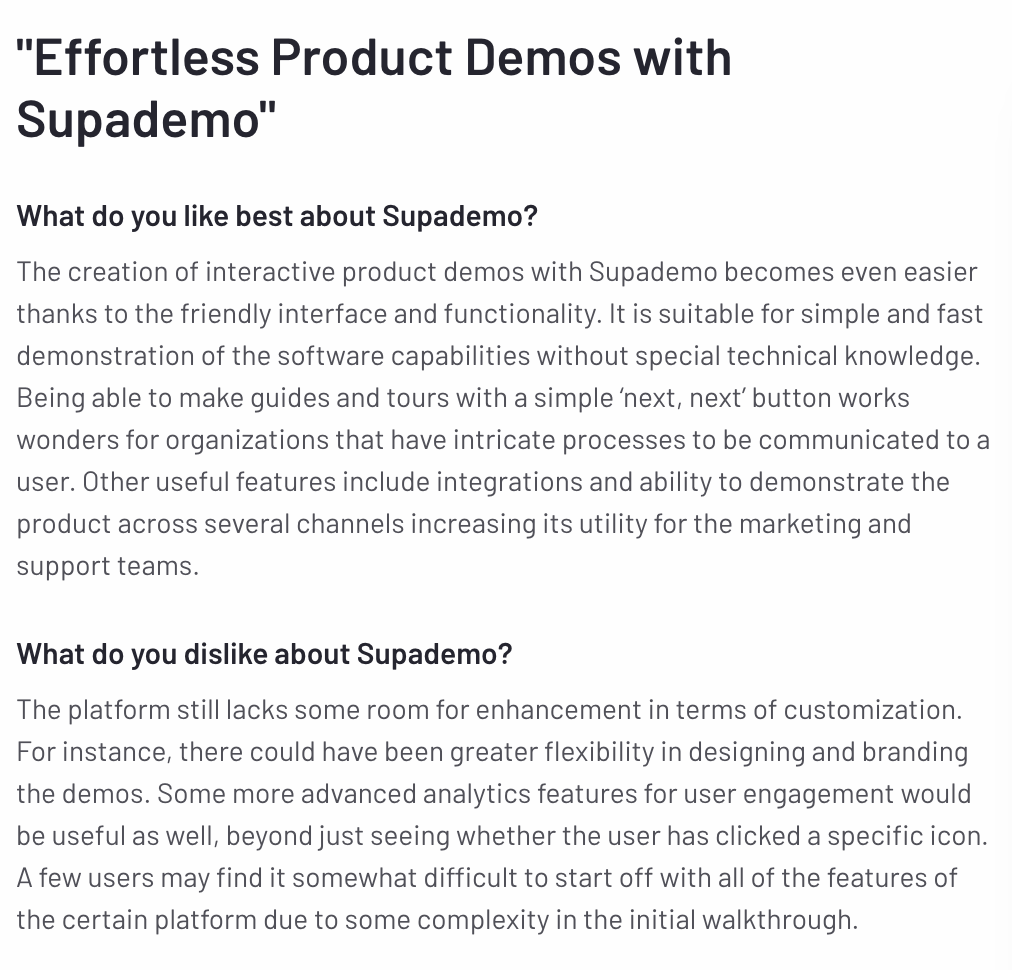
4. Navattic - Best for HTML based demo needs
Navattic has carved out a place in the market with their focus on clean, simple HTML demos that closely mimic the actual product experience.
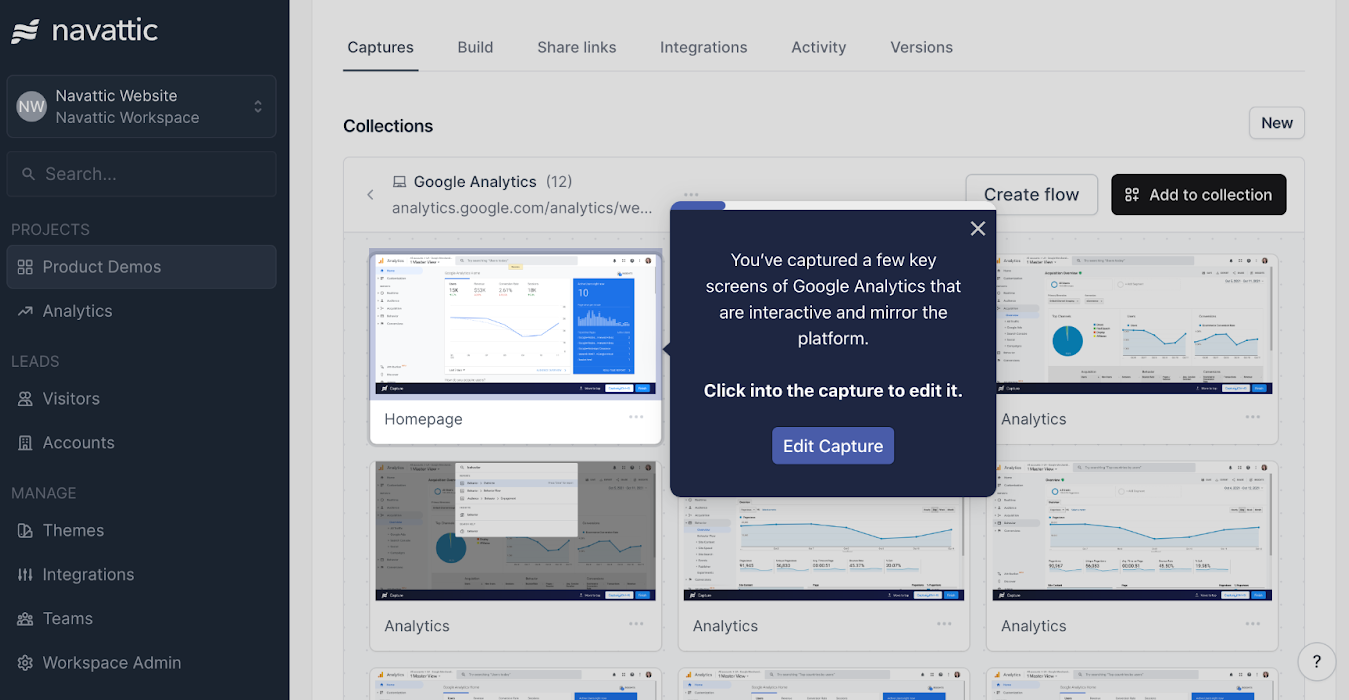
Why customers choose Navattic over Walnut
Like Walnut, Navattic specializes in HTML demos, but with a different approach:
- Marketing-friendly: Navattic's platform is designed with marketers in mind, with strong website embedding options and tools optimized for top-of-funnel use cases.
- Guided HTML tours: Their step-by-step product tours make it easy for prospects to understand complex products without getting lost.
- Clean interface: Many users praise Navattic's uncluttered design that makes it easy to create professional-looking demos.
From our conversations with teams using Navattic, we've heard things like: "Navattic demos feel more realistic than the alternatives we tried. Prospects actually think they're using our real product."
How pricing works
Navattic has recently made their platform more accessible by introducing a PLG free plan
- Free tier for basic demo needs
- Paid plans starting around $500/month
- Substantially lower entry point than Walnut's $9,200/year
Best fit for
Navattic is particularly well-suited for:
- Marketing teams focused on creating website demos
- Companies that primarily need HTML demos and don't require video or screenshot formats
- Organizations looking for a more affordable alternative to Walnut for basic HTML demo needs
The main limitation compared to Walnut is that Navattic lacks some of the sales-specific features that Walnut has built out — demo playlists and in-depth engagement analytics to name a few.
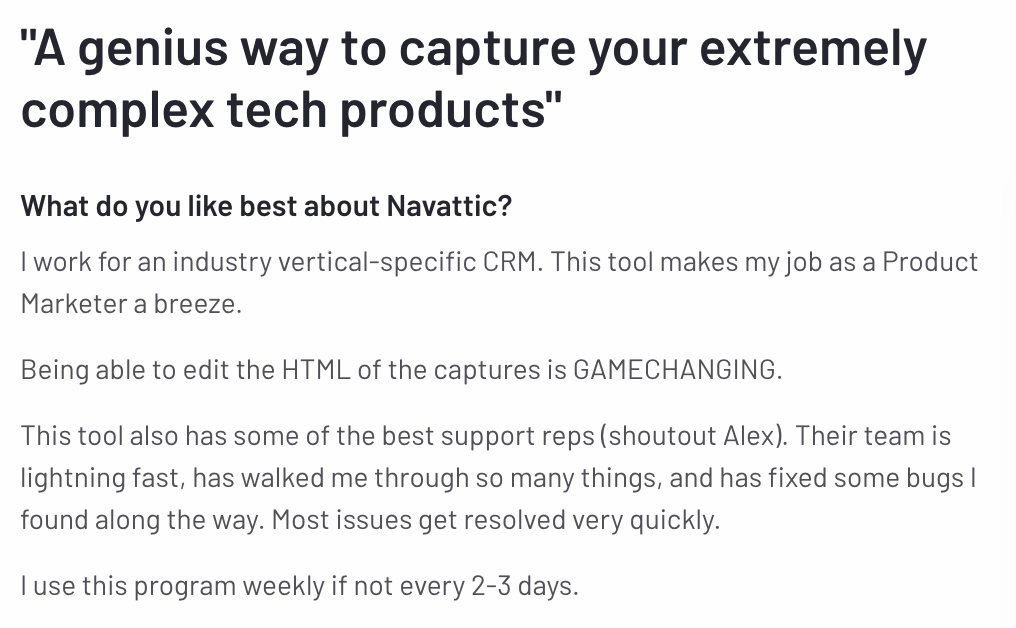
5. Arcade - Best for image based demo needs
Arcade takes a different approach than Walnut, focusing on screenshot and screen recording demos rather than HTML captures.
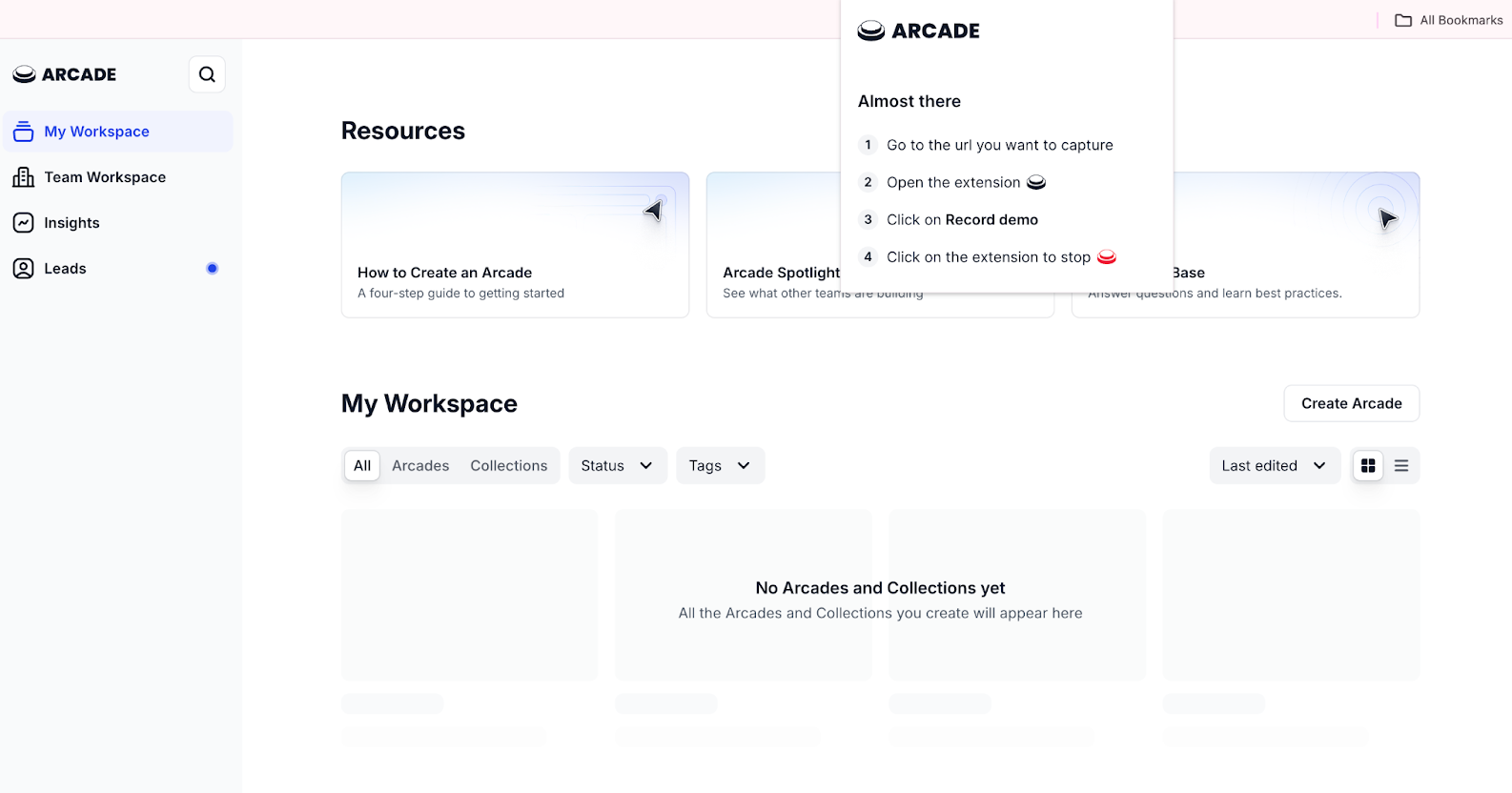
Note: Arcade recently announced early access to HTML capture for enterprise customers.
Why customers choose Arcade over Walnut
Arcade has built their platform around making visual demos as easy as possible:
- Simple recording process: Their Chrome extension and desktop app make capturing clicks, mouse movements, and screen actions quick and painless.
- Rich visual editing: Features like branching paths, camera recording integration, and synthetic voiceovers in 29+ languages enhance the viewer experience.
- Visual storytelling: The platform excels at creating visually engaging demos that showcase product workflows through screenshots and recordings.
How pricing works
Arcade offers multiple entry points:
- Free Plan: 3 demos with basic features
- Pro: $32/user/month
- Growth: $42.50/user/month
- Enterprise: Custom pricing
Best fit for
Arcade is particularly valuable for:
- Marketing teams creating product tours for websites and campaigns
- Companies that value visual polish and engaging experiences
- Teams that find Walnut's HTML capture process too complex
- Organizations that need to demonstrate both web and desktop applications
For teams that primarily need screenshot and video demos rather than HTML interactions, Arcade offers a more streamlined and cost-effective approach than Walnut.
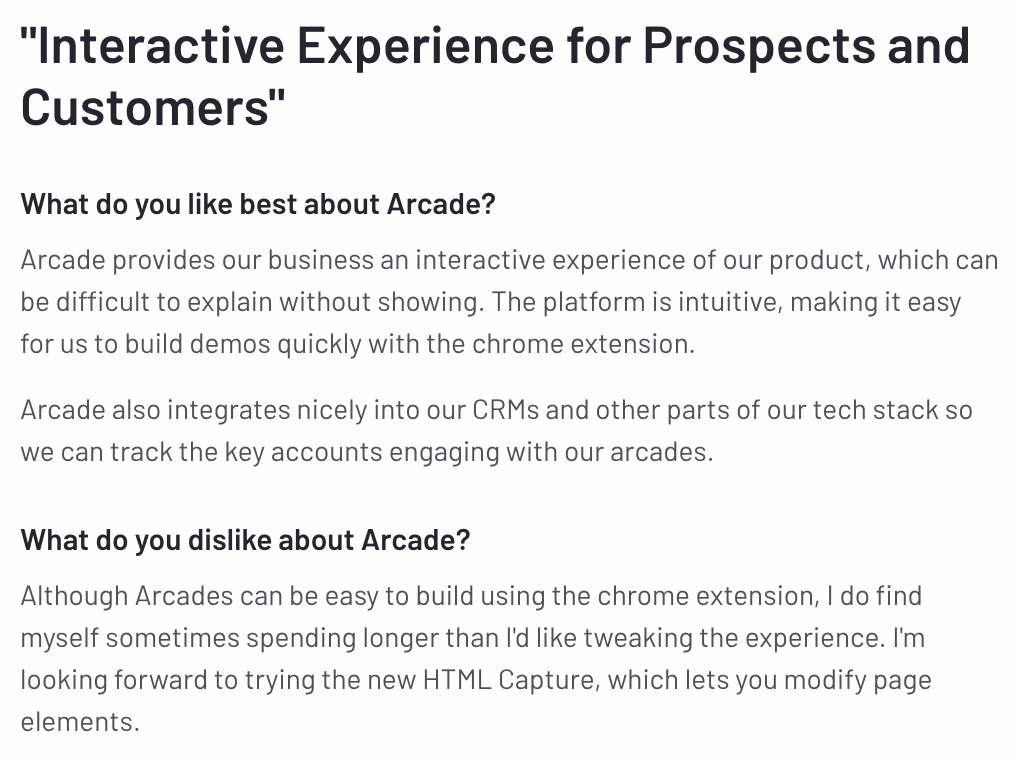
6. Tourial - Best for micro tours and tour centres
Tourial has recently repositioned itself with a unique approach to demo automation, focusing on transforming existing content into interactive experiences.
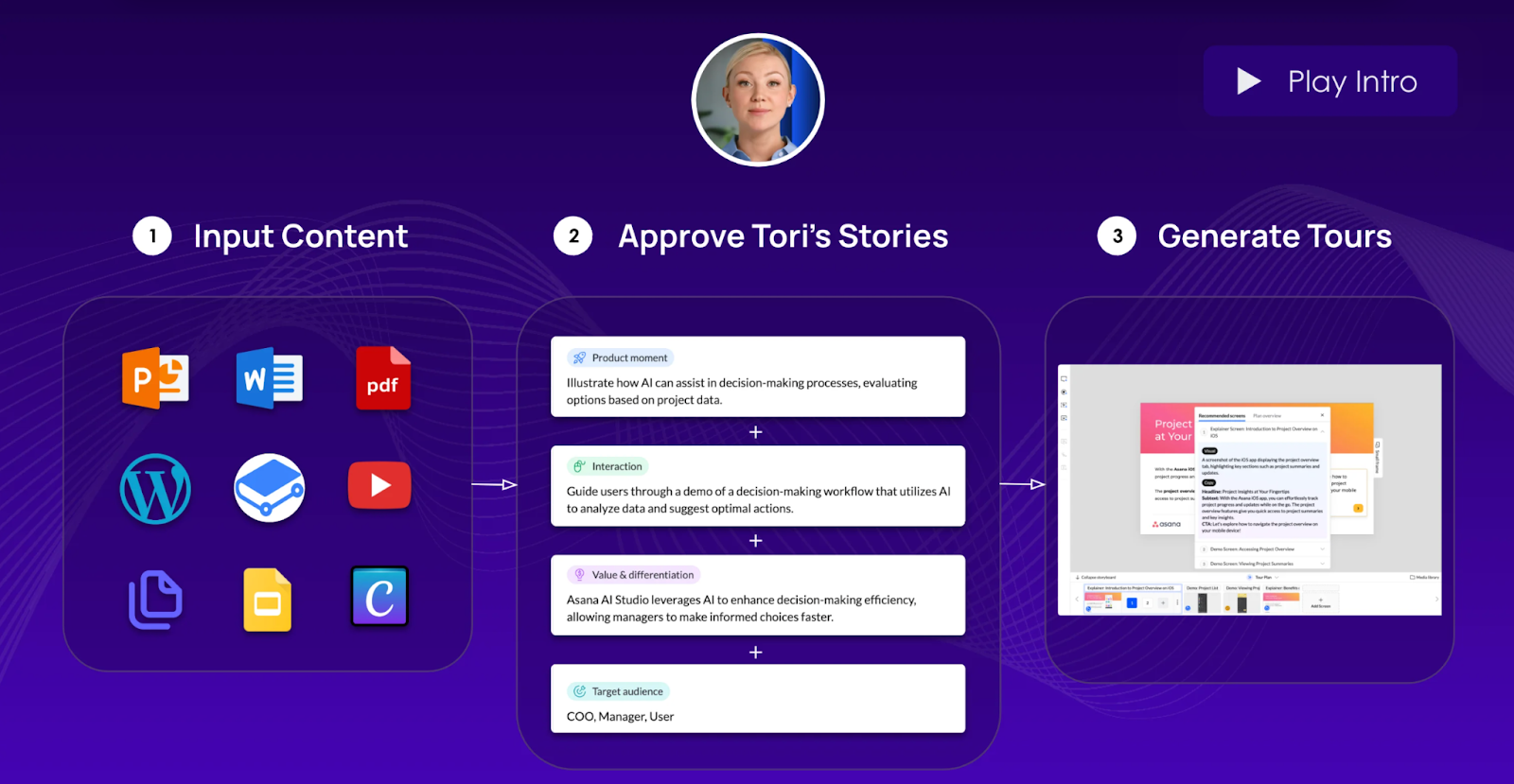
Why customers choose Tourial over Walnut
Unlike Walnut's focus on product demos, Tourial specializes in:
- Content transformation: Their AI wizard converts existing content like demos, case studies, and blog posts into interactive "short stories."
- Tour centers: Creating hubs where visitors can browse collections of demos based on their interests and needs.
- Marketing focus: Optimizing demos for top-of-funnel marketing channels like websites, emails, and social media.
How pricing works
Tourial doesn't publish detailed pricing information, but they offer:
- Two pricing tiers with varying levels of functionality
- Add-on options for demo centers and enterprise features
- Custom pricing for larger implementations
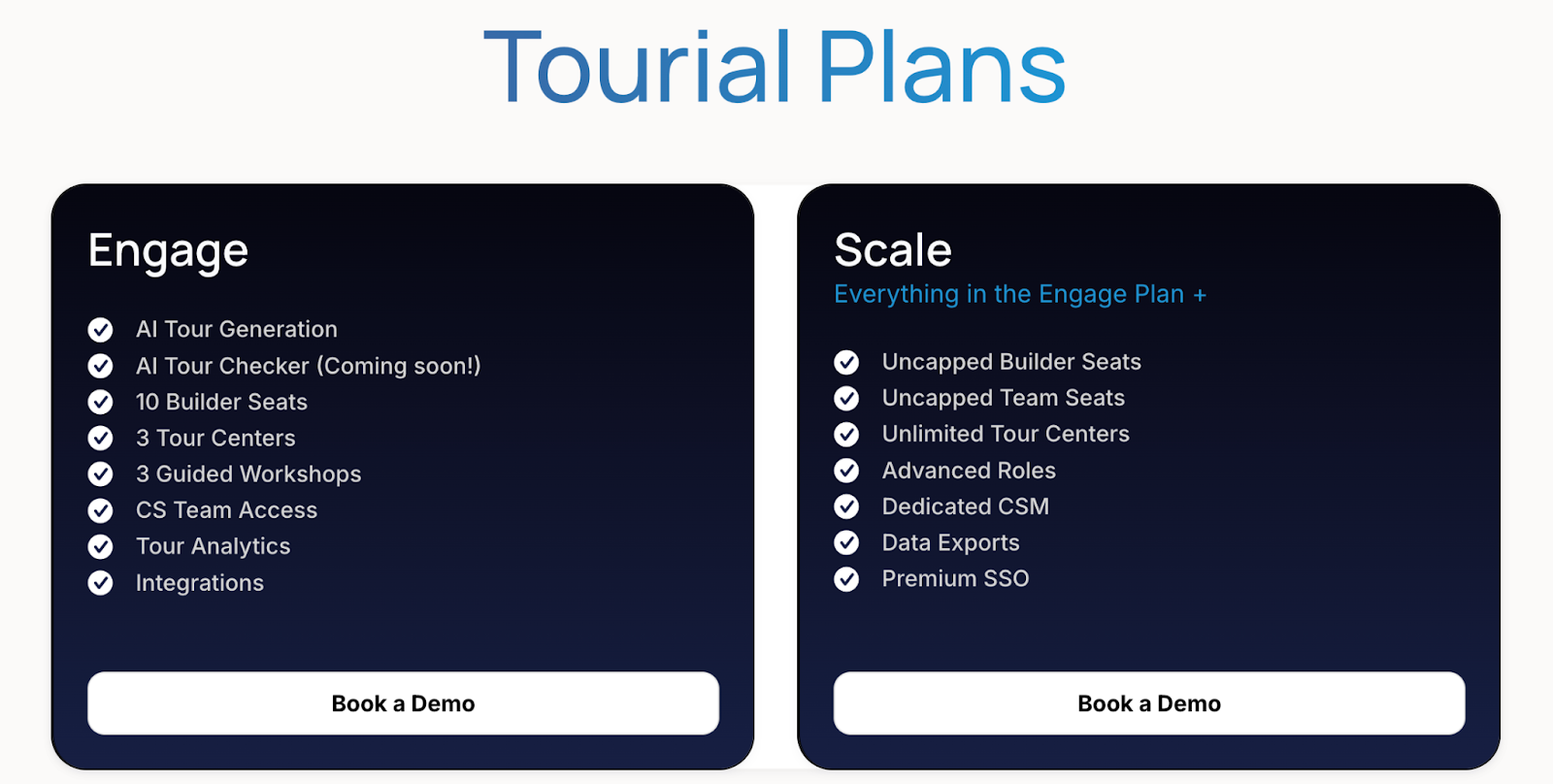
Best fit for
Tourial is particularly valuable for:
- Content marketing teams looking to make static content interactive
- Organizations with a lot of existing content to repurpose
- Companies focused on top-of-funnel engagement rather than sales demos
While Tourial and Walnut both create interactive experiences, they serve different purposes – Walnut focuses on interactive product demos, while Tourial repurposes content into interactive micro tours.
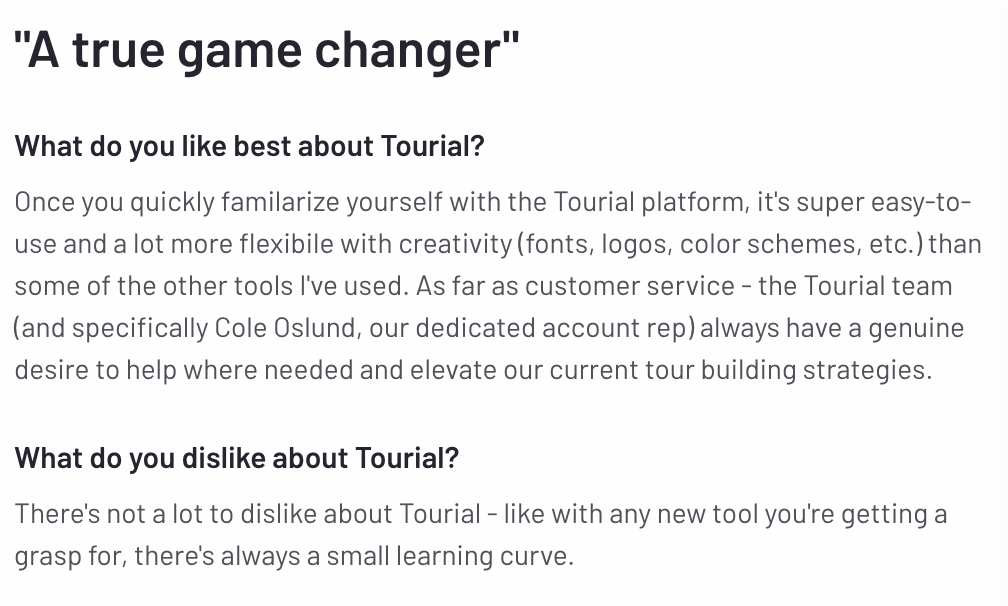
7. TestBox - Best for product overlay/live environments
TestBox takes a fundamentally different approach from Walnut and other demo platforms by creating actual working product instances rather than simulations.
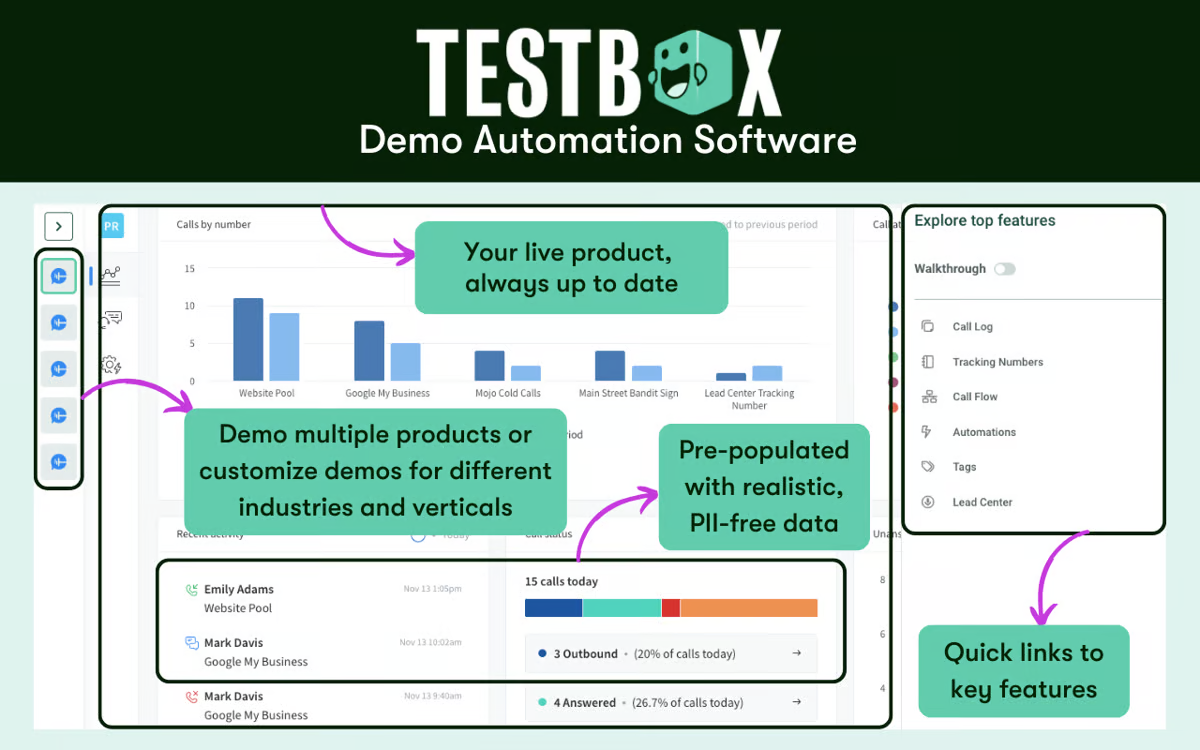
Why customers choose TestBox over Walnut
TestBox has carved out a unique position with:
- Live environments: Creating fully functional versions of your product (known as product overlays) that conveys the most true-to-life product experiences.
- Realistic data: AI-generated sample data that makes the environment feel authentic without using real customer information.
- Complete functionality: Unlike Walnut's HTML captures, TestBox environments include both frontend and backend functionality.
How pricing works
TestBox sits at the high end of the market:
- Starting at $44,750 annually for 15 users
- Growth tier adds approximately $15,000 for expanded capabilities
- No free or low-cost entry points
Best fit for
TestBox works best for:
- Enterprise sales organizations selling complex software
- Products where backend functionality is crucial to the buying decision
- Companies with the resources to invest in premium demo environments
For organizations that need prospects to experience their full product rather than a guided tour, TestBox offers capabilities that Walnut and other HTML-based platforms can't match – but at a significantly higher price point.
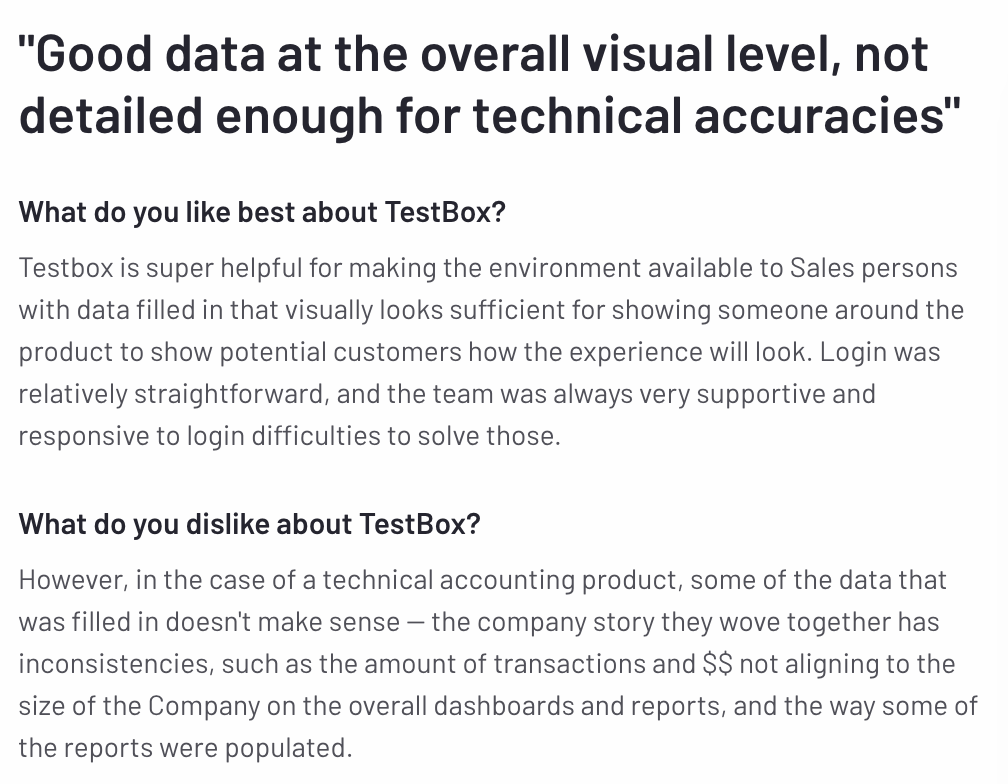
8. Saleo - Best for live demo environments with real data
Saleo focuses on creating live demo environments that allow sales teams to showcase their products using realistic sample data while maintaining the full functionality of the actual product.
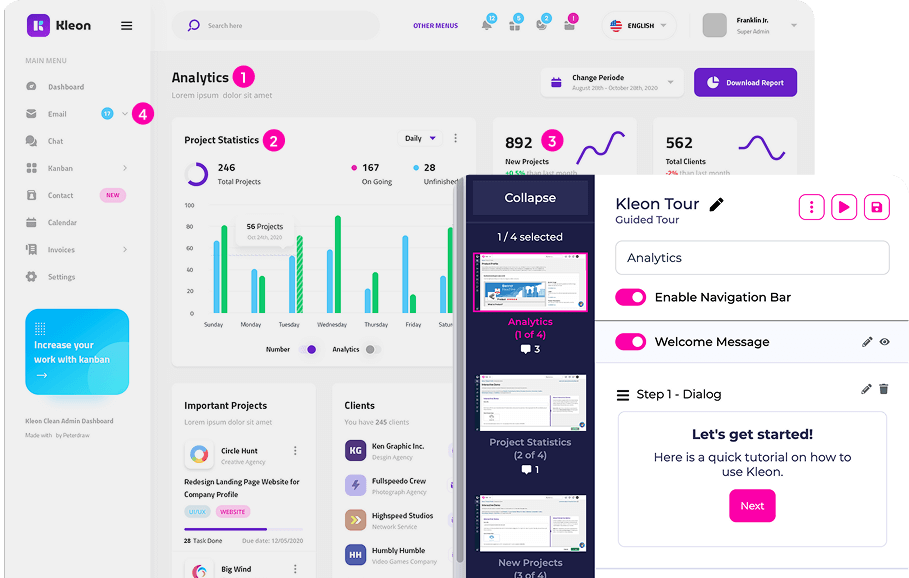
Why customers choose Saleo over Walnut
Saleo differentiates itself through:
- Live environments: Unlike Walnut's captured HTML demos, Saleo creates live environments where prospects can interact with your actual product using sample data.
- Dynamic data management: The platform excels at managing and customizing demo data in real-time, allowing sales teams to tailor demonstrations to specific prospects without exposing sensitive customer information.
- Sales team optimization: Built specifically for sales teams with features like demo coaching, performance analytics, and integration with popular CRM systems.
- Reduced demo prep time: Sales teams can jump into demos without extensive setup, as Saleo maintains consistent, reliable demo environments.
How pricing works
Saleo operates in the enterprise segment:
- Pricing reportedly starts around $20,000 annually
- Enterprise implementations can range from $50,000-$100,000+ per year
- Custom pricing based on team size and feature requirements
- No free tier available
Best fit for
Saleo is particularly valuable for:
- Sales teams that need to demonstrate complex products with realistic data
- Organizations where live product functionality is crucial for closing deals
- Companies that want to reduce the time sales teams spend preparing for demos
- Enterprises with the budget for premium demo solutions
The main trade-off is that Saleo requires more technical setup than Walnut's capture-based approach, but it delivers more authentic product experiences for prospects.
9. Reprise - Best for enterprise sandbox environments
Reprise specializes in creating full-featured sandbox environments that replicate your entire product ecosystem, making it ideal for complex enterprise software demonstrations.
Why customers choose Reprise over Walnut
Reprise stands out with:
- Complete product replicas: Unlike Walnut's HTML captures, Reprise creates full working copies of your product, including backend functionality, databases, and integrations.
- Enterprise-grade security: Built with enterprise security requirements in mind, including SOC 2 compliance, SSO integration, and advanced access controls.
- Sandbox customization: Each prospect can receive their own customized sandbox environment with relevant data, configurations, and use cases.
- Technical depth: Ideal for products where prospects need to test actual functionality, run queries, or experience complex workflows that HTML demos can't replicate.
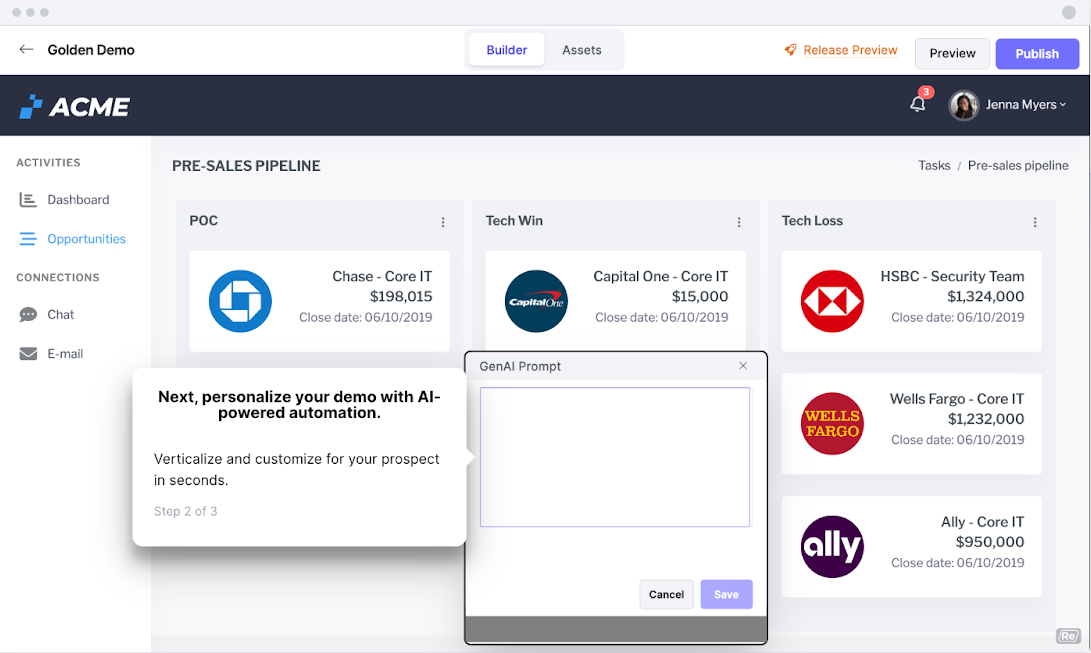
How pricing works
Reprise targets the enterprise market:
- Pricing typically starts around $50,000 annually
- Large enterprise deployments can exceed $200,000 per year
- Custom pricing based on product complexity and user volume
- Implementation and professional services often required
Best fit for
Reprise works best for:
- Enterprise software companies selling complex technical products
- Organizations where prospects need to test actual product functionality
- Companies selling to technical buyers who want hands-on evaluation
- Businesses with the resources to invest in premium sandbox solutions
The platform requires significant technical investment compared to Walnut's simpler approach, but it delivers the most realistic product experiences possible for enterprise prospects.
10. Demostack - Best for cloning production environments
Demostack takes a unique approach by creating pixel-perfect clones of your production environment, allowing prospects to experience your product exactly as your customers do.
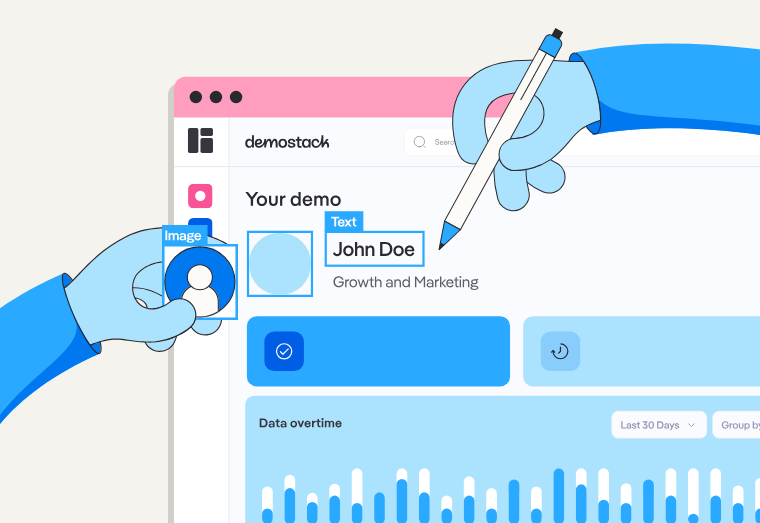
Why customers choose Demostack over Walnut
Demostack's differentiators include:
- Production environment cloning: Rather than capturing HTML like Walnut, Demostack creates exact replicas of your production environment, including all features, data, and functionality.
- Zero maintenance demos: Once set up, demo environments automatically stay in sync with your product updates, eliminating the need for manual demo maintenance.
- Realistic user journeys: Prospects can experience complete user workflows rather than guided tours, leading to more qualified opportunities.
- Advanced personalization: Each demo environment can be customized with prospect-specific data, configurations, and scenarios.
How pricing works
Demostack operates in the enterprise segment:
- Pricing reportedly starts around $30,000 annually
- Enterprise customers can expect to pay $75,000-$150,000+ per year
- Custom pricing based on product complexity and usage requirements
- Professional services and implementation support included
Best fit for
Demostack is ideal for:
- B2B software companies with complex products
- Organizations where prospects need to experience complete user workflows
- Companies that want to reduce demo maintenance overhead
- Enterprises selling to technical evaluators who need hands-on product access
The main consideration is that Demostack requires significant upfront investment and technical integration compared to Walnut's quicker setup process.
Finding the right Walnut alternative for your team
What Makes a Great Walnut Alternative?
After speaking with dozens of companies about their demo platform decisions, we've found that success depends on matching the tool to your specific needs. Here are the key considerations to keep in mind:
What type of demos do you need?
- HTML demos (like Walnut, Navattic, Storylane): Best for web applications where you want to create an interactive, clickable experience that mimics your actual product
- Video demos (like Consensus, Storylane): Ideal for guided walkthroughs with voiceover and personalized paths
- Screenshot demos (like Arcade, Supademo, Storylane): Perfect for quick tutorials and visual guides
- Product environments (like TestBox): Necessary when prospects need to test actual functionality
Which teams will create and use the demos?
- Cross-team usage (Storylane): Designed for collaboration across departments with features for multiple use cases
- Sales-focused (Walnut, Consensus): Optimized for sales processes with features for personalization and tracking
- Marketing-focused (Navattic, Tourial): Better for website embedding, lead generation, and top-of-funnel engagement
What's your budget reality?
- Enterprise budget ($20k+/year): TestBox, Consensus
- Mid-market ($6k-20k/year): Walnut, Storylane
- Small business/startup (Under $6k/year): Supademo, Arcade, Storylane Starter
- Free options to start: Storylane, Navattic, Supademo, Arcade
The bottom line on Walnut alternatives
While Walnut has established itself as a known player in the interactive product demo space, the market has evolved rapidly, with newer Walnut alternatives often delivering better user experiences, more versatile capabilities, and more favorable pricing.
For most teams, Storylane offers the best overall alternative to Walnut with its combination of multiple demo formats, industry-leading ease of use (99/100 G2 score vs. Walnut's 32/100), and significantly lower cost ($6,000/year vs. $9,200/year for comparable features).
Other Walnut competitors excel in specific areas: Consensus for video demos, Supademo for budget-conscious teams, TestBox for full-featured environments, Navattic for straightforward HTML demos, and Arcade for engaging visual experiences.
The right choice depends on your specific needs, but with so many strong Walnut alternatives available, there's never been a better time to explore your options for interactive product demo software.
FAQs about Walnut alternatives
1. What is Walnut.io, and why might someone look for alternatives?
Walnut.io is an interactive demo automation platform that focuses on HTML/CSS-based demos for sales teams. People look for alternatives due to its HTML-only approach, low user satisfaction (32/100 G2 score), high starting price ($9,200/year), and sales-only focus that creates friction for marketing and customer success teams.
2. What are the top alternatives to Walnut.io for interactive product demos?
The top alternatives include Storylane (best overall), Consensus (video demos), Supademo (budget-friendly), Navattic (HTML demos), Arcade (visual demos), Tourial (micro tours), TestBox (live environments), Saleo (live demo environments), Reprise (enterprise sandboxes), and Demostack (production cloning).
3. How does Storylane compare to Walnut.io in terms of features and pricing?
Storylane offers multiple demo formats (HTML, video, screenshot) vs. Walnut's HTML-only approach, significantly higher user satisfaction (99/100 vs. 32/100 G2 score), AI-powered features with Lily AI, and 35% lower cost ($6,000/year vs. $9,200/year for comparable features). Storylane also offers a free plan unlike Walnut.
4. Are there any Walnut alternatives that provide AI features?
Yes, Storylane offers the most comprehensive AI features with Lily AI, including instant demo creation, AI avatars, AI HTML editor, and AI voiceovers in 65+ voices and 25+ languages. Tourial also offers an AI wizard for converting existing content into interactive experiences.
5. Which platforms offer a free plan for creating interactive demos?
Four platforms offer free plans: Storylane, Navattic, Supademo, and Arcade. Walnut does not offer a free tier.
6. Which Walnut alternative offers the best ROI for small to mid-sized businesses?
Storylane offers the best ROI for SMBs with its free plan to start, multiple demo formats, ease of use, and pricing starting at $40/month. For extremely budget-conscious teams, Supademo at $27/user/month is also a strong option, though with fewer features.
Heading 1
Heading 2
Heading 3
Heading 4
Heading 5
Heading 6
Lorem ipsum dolor sit amet, consectetur adipiscing elit, sed do eiusmod tempor incididunt ut labore et dolore magna aliqua. Ut enim ad minim veniam, quis nostrud exercitation ullamco laboris nisi ut aliquip ex ea commodo consequat. Duis aute irure dolor in reprehenderit in voluptate velit esse cillum dolore eu fugiat nulla pariatur.
Block quote
Ordered list
- Item 1
- Item 2
- Item 3
Unordered list
- Item A
- Item B
- Item C
Bold text
Emphasis
Superscript
Subscript
.svg)
Make buying easy with Storylane
Chat with our demo expert to find out how 2500+ companies use Storylane to drive more revenue

.webp)


















